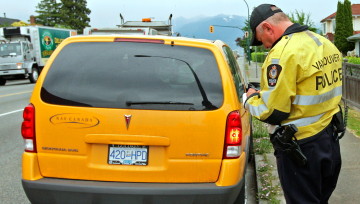

Constable Steve Shaw of the Vancouver Police Traffic Enforcement Unit writes a speeding ticket in 2008. Darryl Dyck/CP Photo THE CANADIAN PRESS
Published on Thursday, Jan. 07, 2010
Don't do any of these things - and above all, don't conduct a curbside trial.
The officer has already decided you did something wrong, or he wouldn't have pulled you over. And he's heard it all.
A survey conducted by InsuranceHotline.com found that the best way to talk your way out of a ticket is by being polite, admit your guilt (if you're guilty) and ask for a break. Getting the police officer to crack a smile doesn't hurt either.
If you're planning to fight the ticket in court, it's not in your interest to tip off the police officer by saying “I'll see you in court.” All that will do is insure that he has his notes clear and in order. In fact if you're really going to fight this, say as little as possible. The last thing you'll need is to have your own words used against you.
If you are offensive towards the officer this triggers his suspicion that you might be hiding something, prolonging the encounter and you may end up with multiple tickets. Be brief and professional.
A common question for the officer to ask is; "Do you know why you were pulled over?" Many drivers give a reason such as; "Was it because I was speeding?" or “I wasn't wearing my seatbelt.” Meanwhile, the officer could have pulled you over tell you your brake light was out.
Through the power of suggestion you might find yourself receiving multiple tickets. Just say "no" if you're asked this question. Trust me, the officer knows why he pulled you over, so let them do their job and tell you.
Fighting A Ticket
When you get a ticket you can plead guilty, guilty with an explanation, or not guilty. Most drivers plead guilty with an explanation. If you are fighting a ticket, you must plead not guilty. Guilty with an explanation is still guilty and you will be convicted. Even if the fine is reduced, you're still guilty and the conviction will appear on your driving record, and your insurance will be affected regardless of demerit points.
Many drivers feel that if they were speeding and get caught, pleading not guilty is like calling the police officer a liar. You're not, so get over it before you walk into the courtroom. You are innocent until proven guilty so let the police prove their case.
Fighting a ticket on the basis that your name has been misspelled or your license plate number is incorrect are not reasons that the judge will dismiss the ticket.
If you are convicted of the offence it's the conviction date that matters to your insurance company, not the day you were ticketed. A ticket conviction affects your insurance for three years.
A license suspension remains on your record for six years. Many insurance companies do not provide preferred rates for drivers where there has been an interruption in their driver license history, as a result of a license suspension. Six years is a long time to wait until you can go back to paying a lower insurance rate.
If you get a ticket, fight it. Maybe you'll be lucky and the police officer won't show up and the ticket will be thrown out.
The more tickets you have, the greater chance of your insurance rate increasing, or the company cancelling you altogether.
Photo Radar
Photo radar has been said to be a license for the wealthy to speed. There are no consequences to getting caught by photo radar. You pay and get away. You do not go to court and your insurance rate never goes up.
Tickets from photo radar have no insurance consequences, as the ticket is assigned to the car and not the driver.
Red-light cameras are used to catch people who run red lights. The negative consequences are that drivers use poor judgment as to whether or not they should blow through a yellow light when they know there's a red light camera, resulting – more often than not - in violent braking.
This may end up causing accidents instead of avoiding them.
Radar Detector
The police use omni-directional radar devices, so they can shoot ahead, behind, to the side, and actually in any direction. If the radar device catches you, you are not automatically guilty. The radar device is used to corroborate what the officer saw.
You may believe that if you're caught speeding you have the right to see the radar gun's output. You don't. Further, if you're planning on fighting the ticket, again, you don't want to make the police officer's documentation all the more thorough as a result of your cross-examination.
Insurance consumer advocate Lee Romanov runs the website www.RomanovReport.com